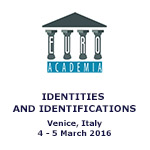Euroacademia Conferences
 Europe Inside-Out: Europe and Europeanness Exposed to Plural Observers (9th Edition) April 24 - 25, 2020
Europe Inside-Out: Europe and Europeanness Exposed to Plural Observers (9th Edition) April 24 - 25, 2020 Identities and Identifications: Politicized Uses of Collective Identities (9th Edition) June 12 - 13, 2020
Identities and Identifications: Politicized Uses of Collective Identities (9th Edition) June 12 - 13, 2020 8th Forum of Critical Studies: Asking Big Questions Again January 24 - 25, 2020
8th Forum of Critical Studies: Asking Big Questions Again January 24 - 25, 2020 Re-Inventing Eastern Europe (7th Edition) December 13 - 14, 2019
Re-Inventing Eastern Europe (7th Edition) December 13 - 14, 2019 The European Union and the Politicization of Europe (8th Edition) October 25 - 26, 2019
The European Union and the Politicization of Europe (8th Edition) October 25 - 26, 2019 Identities and Identifications: Politicized Uses of Collective Identities (8th Edition) June 28 - 29, 2019
Identities and Identifications: Politicized Uses of Collective Identities (8th Edition) June 28 - 29, 2019 The European Union and the Politicization of Europe (7th Edition) January 25 - 26, 2019
The European Union and the Politicization of Europe (7th Edition) January 25 - 26, 2019 7th Forum of Critical Studies: Asking Big Questions Again November 23 - 24, 2018
7th Forum of Critical Studies: Asking Big Questions Again November 23 - 24, 2018 Europe Inside-Out: Europe and Europeanness Exposed to Plural Observers (8th Edition) September 28 - 30, 2018
Europe Inside-Out: Europe and Europeanness Exposed to Plural Observers (8th Edition) September 28 - 30, 2018 Identities and Identifications: Politicized Uses of Collective Identities (7th Edition) June 14 - 15, 2018
Identities and Identifications: Politicized Uses of Collective Identities (7th Edition) June 14 - 15, 2018
Contested Identities among Japanese-Bolivians Pre-War and Post-War Descendants
-
-

-
Presentation speakers
- Yvonne Siemann, University of Lucerne, Switzerland
- Download presentation
Abstract:
The first phase of Japanese migration (“pre-war migration”) to Bolivia started in 1899, when individual Japanese escaped from Peruvian plantations to Bolivian Amazonia. In the 1950s, two Japanese agricultural colonies were founded in Santa Cruz department (“post-war migration”). After a difficult start, many post-war Nikkei (Japanese descendants) have achieved considerable material wealth and an excellent reputation, whereas pre-war Nikkei have often been less successful. Although ‘Nikkei’ can apply to all those with Japanese ancestors abroad, not everybody is considered Nikkei in practice: many pre-war descendants do not identify as Nikkei or join Nikkei activities. However, at the same time, some pre-war leaders claim legitimacy as descendants of the first Bolivian Nikkei vis-à-vis post-war descendants. All these discourses have been influenced by official policies of the Japanese state, Japan’s economic situation and Bolivian notions of citizenship. So how is Bolivian Nikkei identity defined by whom, how and why? What are the discourses of inclusion and exclusion, where are intersections with class identification and what does that mean for the creation of a Bolivian Nikkei community? My research is based on a one-year stay in Bolivia (Santa Cruz area).
-
Related Presentations

Californian Exopolis: Hector Tobar's and Tim Z. Hernandez's Literary Interventions
- Katarzyna Nowak-McNeice

Shifting Focus
- Nicholas Chilvers

Public Movement: Performing Politics through Conflictual Coreographies
- Francesco Spampinato

Europe in Search of Europeans: The Road of Identity and Myths
- Gérard Bouchard













